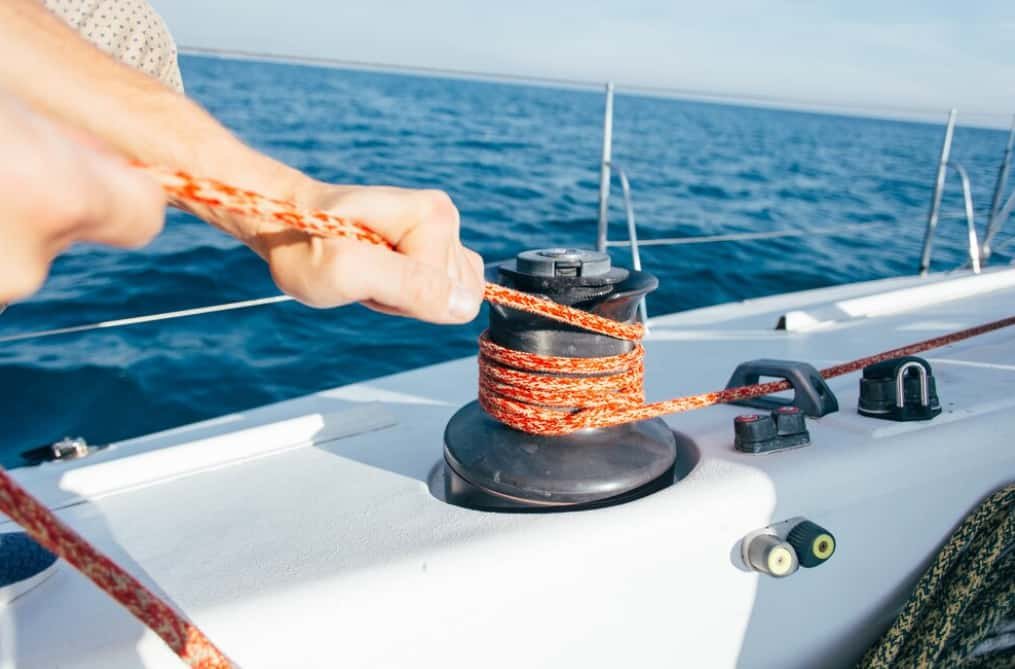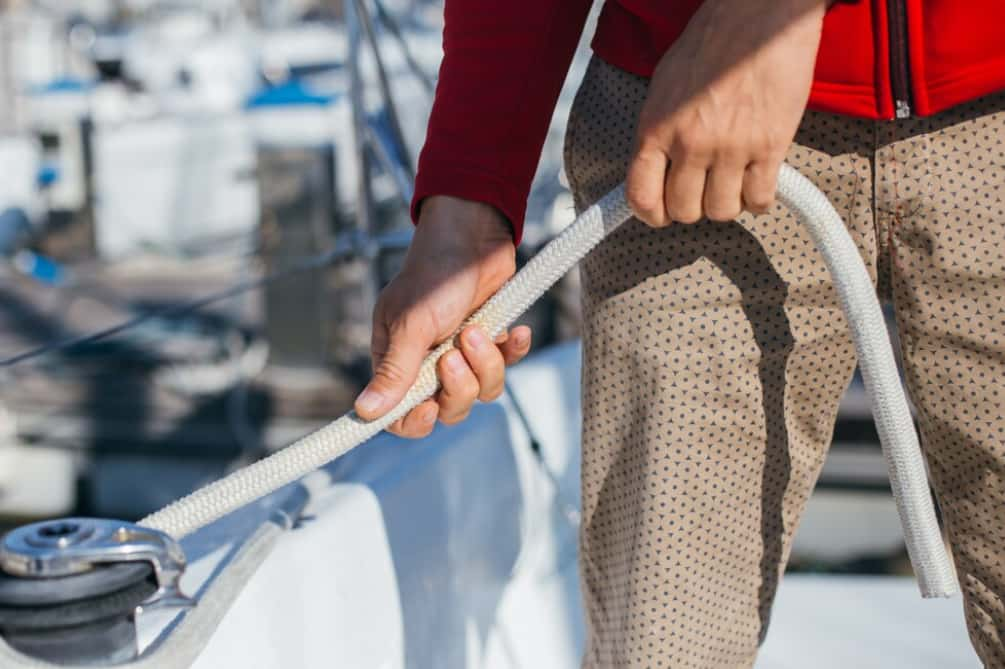Ultimate Guide: Steps on How to Become a Deckhand on a Yacht
A Deckhand position, typically an entry-level job on a yacht, primarily involves the thorough cleaning and upkeep of the yacht’s exterior, ensuring it always looks immaculate. Beyond these duties, being a Superyacht Deckhand offers a thrilling and enriching start to a career. It’s an opportunity to travel worldwide, forge incredible friendships, and acquire a wide array of skills and experiences. For those still contemplating, continue reading to explore more about the life and responsibilities of a Deckhand on a Superyacht.
If you’re interested in the nautical life and are exploring how to become a deckhand on a yacht, it’s also worth considering the social side of seafaring—like knowing what to wear to a yacht party to blend seamlessly into the yacht’s luxurious lifestyle.
Starting a Career as a Deckhand on Various Marine Vessels
Embarking on a career as a Deckhand on a boat or large ship involves understanding the industry and the role itself. This guide will help you navigate the path to becoming a Deckhand, covering essential steps and considerations:
Grasping Deck Operations and Hierarchy
A Deckhand is an integral part of the marine crew, responsible for various tasks such as handling lines, assisting in docking, and maintaining safety equipment. Key to success in this role is a thorough understanding of the vessel’s structure and the chain of command, typically comprising:
- Captain or Master;
- Deck Officers;
- Mates (Chief, 2nd, and 3rd);
- Able Seamen;
- Ordinary Seamen.
Your responsibilities might vary based on the type of vessel, be it a fishing boat, container ship, or another kind of marine craft. Understanding and respecting the hierarchy is vital, as it ensures safety and efficiency on board. As a Deckhand, you’ll start at a junior level, but with experience and knowledge, you can advance in rank and responsibility. This career is ideal for those who are committed, hardworking, and adaptable to the dynamic maritime environment.
Participate in a Maritime Training Program
Enrolling in a maritime training program equips you with essential skills, knowledge, and safety protocols for a maritime career, whether on small boats or large merchant vessels. These programs offer courses that provide the necessary qualifications for career advancement.
Such training accelerates your career progression, paving the way to roles like Deck Officer, Engineer, or Captain. The maritime industry offers various career paths, each with specialized education routes tailored to specific roles.
Seek Entry-Level Maritime Opportunities
Starting a maritime career often involves seeking entry-level positions, such as Deckhand roles. These positions are commonly available on tugboats and vessels operating in inland waters, rather than the open sea.
If you’re uncertain about a long-term maritime career, beginning as an entry-level Deckhand offers a practical glimpse into the industry. This experience can be a stepping stone, helping you gain qualifications for higher-paying roles and career advancement.
For those committed to a maritime career, options include progressing on smaller inland water vessels or embarking on journeys aboard large ocean-going ships, offering chances to visit new places and experience diverse cultures.
Seek Opportunities to Enhance Your Skills
Demonstrating effective collaboration and a steadfast commitment to overcoming challenges can significantly contribute to your professional advancement.
Aspiring to progress in your role as a Deckhand requires a proactive approach to continuous growth, encompassing the accumulation of experience, knowledge, and valuable connections. Engaging in networking opportunities not only facilitates building meaningful relationships but also propels you onto an accelerated path for career advancements and promotions.

Qualifications Required to Become a Deckhand
When aiming to become a Deckhand, it’s important to focus on three key areas of qualifications and experience. The first two are obligatory for anyone aspiring to work at sea, while the third is more variable, depending on your personal work experience and past job roles.
- ENG 1 Medical Certificate: This is a mandatory health certification for all crew members working at sea. If your goal is to become a Superyacht Deckhand, it’s advisable to obtain the ENG1 medical certificate before proceeding to the next step;
- STCW Basic Safety Training: This training is a fundamental requirement for all crew members to ensure preparedness for emergencies onboard. The STCW (Standards of Training, Certification, and Watchkeeping) course spans six days and includes modules on sea survival, first aid, firefighting (which is often found to be quite engaging), and health, safety, and security;
- Gaining Relevant Experience: While a yachting background isn’t a prerequisite for working on a Superyacht, having some foundational knowledge is beneficial. Superyachts typically look for candidates who demonstrate a strong work ethic, enjoy outdoor activities, and possess good interpersonal skills. If you have experience in fields like hospitality, engineering, carpentry, electrical work, water sports instruction, divemaster, or similar areas, this can significantly enhance your CV.
It’s a general truth in the job market that the more experience and skills you can bring to a new position, the better your prospects. So, if you’re new to the yachting world and seeking to acquire the necessary qualifications before embarking on this career path, starting with these foundational steps is crucial.
Starting a Deckhand Career Without Prior Experience
Embarking on a career as a Deckhand on a Superyacht doesn’t necessitate previous experience in yachting or holding a Yachtmaster certification. In fact, many members of Superyacht crews start without a background in boating. Once you join a yacht crew, they will guide you through the necessary skills and expectations.
While not required, having experience in water sports, diving, or any boat-related activities can be advantageous. However, don’t be discouraged if your experience lies outside practical roles or boating.
Beyond the essential qualifications previously discussed, a common trait among successful crew members is the enthusiasm for working outdoors, often under the sun.
The key attributes that Superyachts value are a positive attitude, a willingness to work diligently, and being a cooperative team member. If you bring a proactive and positive mindset, you have the potential to succeed in this field. Training providers like Flying Fish are equipped to furnish you with all the necessary qualifications and skills. Your part is to come prepared with a strong work ethic and a positive attitude.
What does a Deckhand do?
The role of a Deckhand encompasses a broad range of responsibilities, making it a challenge to summarize in a single article. As a Deckhand, the yacht becomes your home, and the crew, your family. Living, working, and eating onboard, you immerse yourself in the unique lifestyle that comes with this profession.
- The yacht ensures your well-being, with a chef preparing your meals while onboard. Your employment contract will outline specific details such as your duties, salary, working hours, and holiday entitlement. Additionally, the yacht provides your uniform and may offer further training as needed;
- The duties of a Deckhand can vary significantly depending on several factors, including the yacht’s size, crew number, whether it’s privately owned or chartered, the preferences of the owner and Captain, among others. However, a key responsibility for the deck team is maintaining the yacht’s exterior and its various ‘toys’;
- Your tasks will likely include washing the yacht, cleaning windows, scrubbing teak decks, and polishing stainless steel surfaces. When guests are onboard, your role may expand to include operating tenders and jet-skis, assisting with water sports activities, and even performing lookout duties in the bridge. Each yacht brings its unique demands and experiences, making the role of a Deckhand diverse and dynamic.
Earnings Potential for a Deckhand on a Superyacht

The monthly salary of a Deckhand on a Superyacht typically ranges from €2,000 to €3,500, with the average being around €2,500. It’s noteworthy that salaries on Superyachts are generally paid in Euros. Several factors influence a Deckhand’s salary, with the yacht’s allocated “crew” budget being a primary determinant.
This budget is set by the yacht’s owner or the managing company and is used by the captain for hiring crew. Since each yacht operates with a different budget, there can be slight variations in the salaries offered to crew members across different yachts.
Another factor affecting your total income is whether you are employed on a charter yacht or a private one. For charter yachts, it is common for guests to tip the crew, typically around 10% of the charter fee. The cost of chartering a Superyacht can range from €250,000 to €1 million per week.
These tips are usually divided equally among the crew members. On average, a week’s charter can result in additional earnings of €2,000 to €5,000 per crew member, which is an addition to the regular monthly salary. Thus, working on a charter yacht can significantly augment a Deckhand’s earnings.
Conclusion
Becoming a Deckhand can be the first stepping stone into an adventurous maritime career. While it does require certain qualifications and a willingness to work hard, the benefits are significant. So are you ready to set sail on the journey to becoming a Deckhand? Starting a journey as a Deckhand is the gateway to an adventure full of global travel, skill development, and lifelong friendships. While the role primarily involves maintaining the yacht’s exterior, it’s also a stepping stone toward advanced maritime positions. Entry-level Deckhands can climb the ranks to become Deck Officers, Engineers, and even Captains with dedication, experience, hard work, and the proper qualifications. Whether on a Superyacht, boat, or large ship, the Deckhand’s career is filled with dynamic challenges, outstanding rewards, and an unparalleled lifestyle.

Leave a Reply